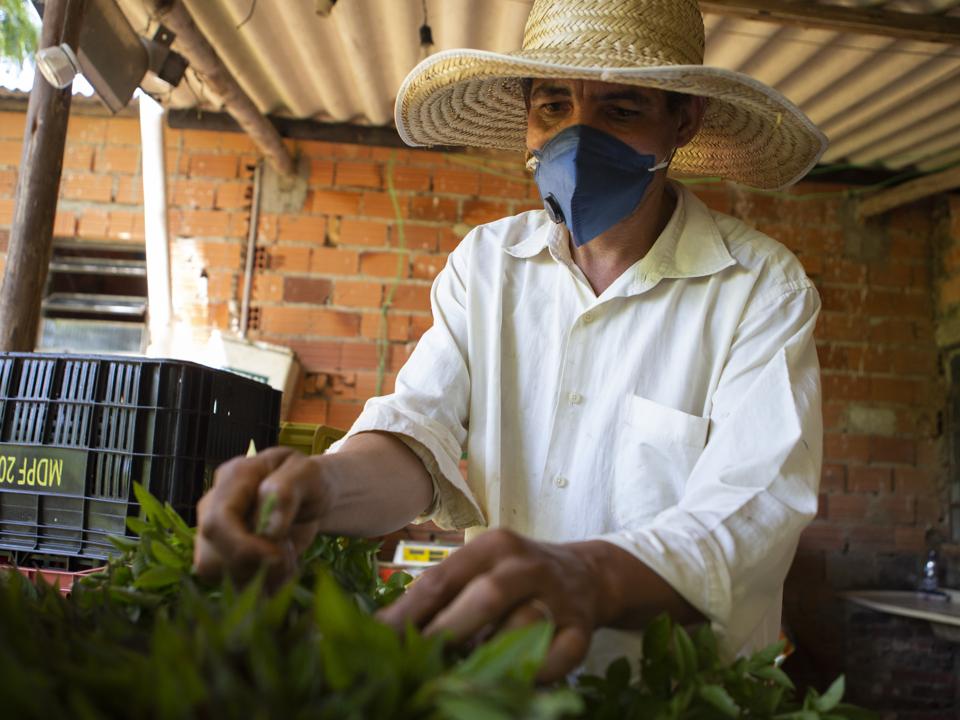The journey of food from producers to geographically dispersed consumers relies on large, complex supply chains that, if disrupted, can impact food supplies and throw the global food system into a state of crisis.
COVID-19 labour shortages, logistics interruptions, and supply and demand inconsistencies have significantly impacted production, distribution and inventory levels across the entire food system, resulting in empty supermarket shelves, food wastage, the shutdown of processing plants, terminated exports and an upsurge in global food insecurity.
The threat of global food system crises can be mitigated through strong local food systems with transparent supply chains that empower communities and boost local food security.

Local food is more important now than ever before, as a means of improving food security while … [+]
getty
The World Economic Forum has advised countries and consumers of the “post-COVID need” to support “local food systems with shorter, fairer and cleaner supply chains that address local priorities” and Cambridge University has referred to the COVID-impact on local food systems as “a new chapter in the field of global food security.”
A survey conducted by Ipsos Mori and the Food Standards Agency in the United Kingdom found that 35 per cent of consumers are buying more local foods than before the crisis.
Here are five reasons why local food initiatives such as urban farming, shared community gardens, victory gardens, local commercial production, farmers markets, farm to fork dining and community supported farms are the way of the future
Locally sourced food provides social benefits to communities
“Commodity chains hide the relationships that sustain us,” said Vincent J. Miller, a professor of theology at the University of Dayton, in a recent interview with America Magazine. “Deprived of that knowledge, it is hard to develop a moral concern for the people who manage the supply lines.” Local consumption creates customer loyalty and important human connections within communities, which is important during times of crisis.
Locally sourced food is good for local economies
Layoffs, shut downs and mobility restrictions have severely affected local economies. With reduced livelihoods, COVID-19 food shortages and “the move to local” there has been a boost in rural entrepreneurship. All over the world, farmers have taken control of their own distribution, offering food boxes with whatever is in season. With communities sourcing food from local farmers, money remains within the community, helping to sustain local producers and their families.
Locally sourced food is healthier and safer
Locally sourced food is typically picked at the optimal stage of ripeness and is consumed shortly thereafter, making it fresher and more nutritious with stronger immunity boosting properties.
A 2008 study reported in the International Journal of Food Sciences and Nutrition found that imported broccoli has half the vitamin C of locally sourced broccoli. According to the Rodale Institute, “most non-local produce is picked before it is fully ripe so it can survive the trip to the grocery store. This may be great for business, but when a plant is allowed to linger on the vine and fully ripen before being harvested, its nutrient content is higher.”
Food with fewer supply chain touch points also has a much lower risk of contamination. Supply chain transparency typically offers a heightened sense of security among consumers.
Locally sourced food is more resilient to supply chain disruptions
The density and complexity of larger, geographically dispersed food systems makes them more vulnerable to supply chain shocks.
Transportation issues, for example, can cause major disruptions for food supplies that have to travel hundreds of miles or more to get to consumers. The same holds for disruptions at processing plants, packaging plants, and distribution centres.
Local food producers are not as dependent on labour, transport, packaging or distribution. Easy access to the source of production creates greater resilience and food security.
Locally sourced food is better for the environment
Whether it is in packaging, processing, transportation or distribution, the length of the journey that food takes between production and consumption has an environmental impact at each stop along the supply chain. Shorter distances between producers and consumers are associated with fewer carbon impacts and less waste. Local production also creates greater accountability among producers which means that they will be more likely to engage in environmentally responsible practices.

IPERO, BRAZIL – APRIL 01: Francisco an organic producer wearing a mask checks his produce on April … [+]
Getty Images
Before COVID-19, food security issues were largely the concern of developing countries and Small Island Developing States. These are now the concern of all countries, both rich and poor.
While the global food system provides the world’s population with greater access and variety, improving lifestyles, generating economic opportunities and contributing to the food security of small nations, local food security strengthens both local and global food systems and unlike food systems that are dominated by “Big Food,” there are no winners and losers— everyone wins.
Technology can play an important role in alleviating the vulnerability of local food systems— susceptibility to climate change, food seasonality, limited economies of scale and fewer markets— by connecting consumers with producers, creating more efficient and fair markets, enhancing production efficiency and improving climate resilience. Local agro-processing and cottage industries can create added markets for locally grown foods while regional and intra-regional food systems can address some of the risks and limitations associated with relying on locally sourced food.
While consumers might not soon forget images of cramped meat processing plants, farmers destroying crops due to supply chain disruptions or the elevated COVID risks of those with non-communicable diseases caused by unhealthy diets, the reality is that the Big Food sector that drives much of the global food system is not going anywhere anytime soon.
In this light, local food production is more important now than ever before. Sourcing food locally reduces the threat of supply chain shocks while offering a plethora of social, economic, nutritional and environmental benefits to consumers, producers and their communities.
